Book contents
- Reading in a Second Language
- The Cambridge Applied Linguistics Series
- Reading in a Second Language
- Copyright page
- Dedication
- Contents
- Figures
- Tables
- Preface
- Part I Foundations of Reading
- Part II Patterns of Variation in Reading
- Part III Developing Reading Comprehension Abilities
- 11 Vocabulary and Reading Comprehension
- 12 Building Main Idea Comprehension: Syntax and Strategies
- 13 Becoming a Strategic Reader
- 14 Building Awareness of Discourse Structure
- Part IV Expanding Reading Comprehension Skills
- Part V Applications of Reading Research: Instruction and Assessment
- References
- Author Index
- Subject Index
11 - Vocabulary and Reading Comprehension
from Part III - Developing Reading Comprehension Abilities
Published online by Cambridge University Press: 01 September 2022
- Reading in a Second Language
- The Cambridge Applied Linguistics Series
- Reading in a Second Language
- Copyright page
- Dedication
- Contents
- Figures
- Tables
- Preface
- Part I Foundations of Reading
- Part II Patterns of Variation in Reading
- Part III Developing Reading Comprehension Abilities
- 11 Vocabulary and Reading Comprehension
- 12 Building Main Idea Comprehension: Syntax and Strategies
- 13 Becoming a Strategic Reader
- 14 Building Awareness of Discourse Structure
- Part IV Expanding Reading Comprehension Skills
- Part V Applications of Reading Research: Instruction and Assessment
- References
- Author Index
- Subject Index
Summary
Chapter 11: Vocabulary and Reading Comprehension. This chapter highlights the central role that vocabulary knowledge plays in reading comprehension and reading development, for both L1 and L2 learners. The centrality of lexical knowledge for reading is supported now by decades of research across many L1 and L2 settings. In particular, the Lexical Quality Hypothesis, as the central concept of the Reading Systems Framework, is the main support for reading comprehension skills. This central idea applies to both L1 and L2 reading development. A further key idea argues that reading amount is the primary mechanism for the development of lexical quality, and by extension, reading abilities. Learning words in context is a complex notion that is developed in detail. Most important in this regard, is the major impact of incidental word learning from both extensive reading and background knowledge. The chapter closes with implications for instruction.
Keywords
- Type
- Chapter
- Information
- Reading in a Second LanguageMoving from Theory to Practice, pp. 255 - 283Publisher: Cambridge University PressPrint publication year: 2022

